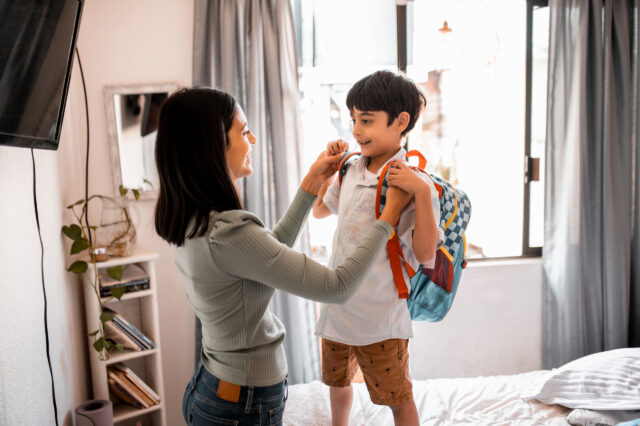6 Tips to Keep Your Children Poison Free for Back to School
To ensure a safe start to the school year, it is important to have conversations with your children about the danger of social media dares, accidents that can happen with medications and other safety issues that may affect them.

A young woman helps her son with his backpack
In just a few weeks, school buses will crowd the roadways again. Back-to-school shopping is already underway and families are preparing for a major shift in their daily household routines.
“The pandemic and social media pressures have changed the back-to-school American ritual,” said Dawn Sollee, PharmD, a University of Florida associate professor and director of the Florida/USVI Poison Information Center – Jacksonville. “However, with some planning, good conversations with your children and simple poison proofing, everyone can get the school year off to a terrific and safe start.”
Here are a 6 things to consider that will help keep your children poison free:
1. Social Media Dares/Pranks
Students daring each other to do things they shouldn’t is not a new phenomenon. What is new today is the amplification dares get through social media. Challenges like the “One Chip Challenge,” requiring you to eat a specific brand of extremely spicy chips –,sent students across the country to the hospital last year. Poison centers still get calls about children eating laundry packets for the Tide Pod challenge and our center received dozens of calls from children drinking hand sanitizer at the start of the 2021 school year because of dares. It’s important to have ongoing conversations with your children to stay ahead of the next dangerous trend, especially if it involves medication or chemicals. Most importantly, remind students that if their peers dare them to do something potentially dangerous, they should say no or walk away.
2. Caffeine/Energy Drinks
Getting students out of bed and going in the morning can be a chore. Some students want caffeine to help get through the day, to stay up and study or to prepare for after-school activities. Energy drinks are popular because they contain large amounts of caffeine and other stimulants. These drinks pack a powerful punch and many include more caffeine than a large cup of coffee. Large doses of caffeine can result in negative side effects, such as nausea, insomnia, headaches and rapid heartbeat.
3. Medication Mistakes
Medication mistakes are one of the most frequent calls the poison center receives year-round. However, the change in routine from summer to school can lead to two common issues: medication mix-ups and medication double doses. Mornings can be especially hectic when trying to get everyone out the door. This distraction can lead to mix-ups and giving the wrong medication to a child. Parents should slow down, read the label every time and keep all medication in its original containers. Have one parent assigned to hand out medicine in the morning and mark the medication as administered on a calendar to minimize the risk of double dosing.
4. Cleaning Products/Hand Sanitizer
Back-to-school shopping lists now include more than paper, pens and pencils. Anti-bacterial wipes, disinfectant spray and hand sanitizer for the classroom are on many lists. While these products help protect children from germs, they present a poisoning hazard. Students should learn how to use these products safely and understand the dangers if they don’t.
“We received too many calls last year involving hand sanitizer ingestion and ocular exposures,” said Molly Stott, PharmD, an emergency medicine and toxicology fellow at the Florida Poison Information Center – Jacksonville/USVI. Stott is part of a team who answers calls on the poison center’s helpline. “Many of the calls involve children daring each other to drink this stuff.”
5. Pens, Pencils, Markers, Crayons
It’s common for small children to put things in their mouths no matter how many times you tell them not to. Products meant for writing and coloring should not be put in the mouth or eyes. The poison center gets calls when children eat pencils due to concerns about lead poisoning. Pencils are now made of graphite, not lead, eliminating that concern. Most pen ink and crayons are non-toxic and can be tolerated well if some gets in the mouth. Even though most school glue is non-toxic, it should not be eaten. If your child does ingest or get something in their eyes, call the poison helpline at 1-800-222-1222 for a quick check.
6. Playground Safety
Florida’s moist climate is perfect for breeding mushrooms. A quick trip to the playground can put students in the midst of the fungus. It’s hard to tell the difference between poisonous and non-poisonous mushrooms. Stress to your children to never pick or eat mushrooms. If they do, wash their hands and call the poison center.
No matter how much you prepare, accidents happen. Sollee recommends to save the poison center’s number and have it on hand in case of emergencies. There are health care providers on staff 24/7 answering calls who can help. You can reach the poison center at 1-800-222-1222. All calls are free and confidential.